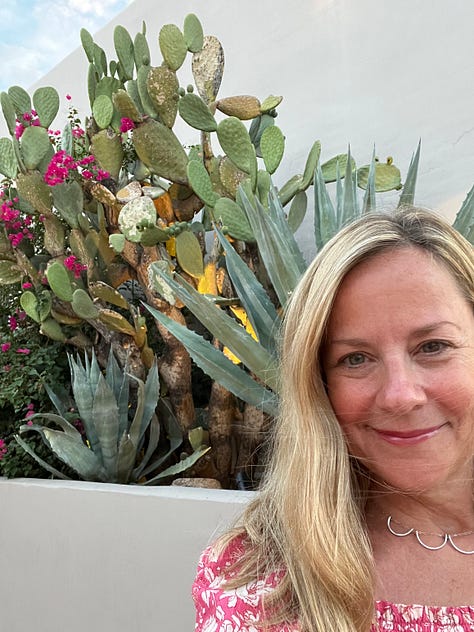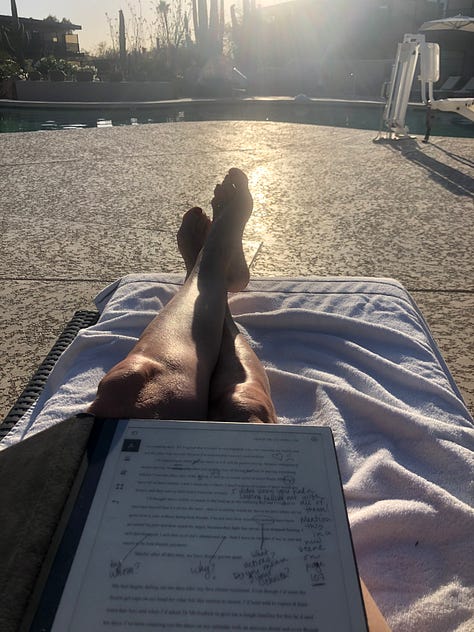Secrets To Hosting A Meaningful Writing Retreat Without Losing Your Mind
After years of hosting retreats for writers, here's how I've pulled together my most recent writing retreat — and the secrets I've learned to push through the challenges.
I’m writing this piece as quickly as possible, even if that means it’s filled with typos and grammatical errors and phrases I could make that much better. Why? Because I want you to know — and even feel — the sense of urgency I have for the Write To Heal Retreat, and I don’t want to overthink as I write, since this imperfect approach — without editing or putting too much thought into the process — is EXACTLY what the retreat is all about.
The Write To Heal Retreat focuses on expressive writing in a gorgeous wellness resort in Carefree, Arizona. We don’t edit ourselves as we work through challenging memories. We reclaim our authentic voices by reframing old stories and painful thoughts. By turning our churning, unresolved thoughts into written words, we improve our physical, emotional, and interpersonal health.
Having learned the value of literary citizenship from wonderful mentors, industry leaders, and generous peers, I’m often on the lookout for wisdom and takeaways I can share with others.
For me, the desire to host writing retreats has never been a choice; it’s always a calling. So, when I feel driven by lessons learned and feel that I just HAVE to share them, I listen, knowing my efforts will likely be worthwhile to others in a retreat setting.
My early writing retreats were always inspired by my desire to bring women writers together — something I personally benefited from and appreciated as a new and nervous writer. I had so many questions, so much insecurity, and a deep desire to immerse myself in the world of writing… so what better way to address those issues than invite groups of writers to cozy weekend getaways to focus and connect on our works-in-progress?
I learned a lot from my earliest efforts, and I often felt like an imposter. I’d never hosted writing retreats before, so who was I to even do it? But, it turns out that the best way NOT to be a newbie at something is to jump right off that dock and do it, so jump I did.

My first retreat, just like anything I’ve ever done for the very first time, was absolutely nerve-wracking.
Before that 1st retreat, I wondered:
Will I price it properly? Will I fill the spots? Will I have the right food (and in the right amounts)? Will my guests feel comfortable? Will I come off like an anxious wreck? Will guests leave feeling like they’ve gotten their money’s worth? Will they be generous with their feedback so I might improve future retreats?
During that 1st retreat, I wondered:
Are my nerves showing? Are the guests enjoying themselves? What have I forgotten? How does this retreat compare to others? Who’s needing a little extra attention? Does anyone need me to act as a buffer?
And after that 1st retreat, I wondered:
Why did I let myself worry about so damn much? Why didn’t I give myself more credit along the way? Why am I exhausted (in the best way) to the BONE? Why did I try to do everything myself? Why didn’t I do this sooner?!?!
After that first time, I finally realized some secrets to hosting a meaningful writing retreat without losing your mind, and here they are:
Design Your Retreat From a Place of Unflinching Enthusiasm and Passion
If you’re wishy-washy on why you’re doing this, then wait.
If you’re doing this just to earn money, then for goodness’ sake, do something else, since writing retreats tend not to provide income streams of significance.
While some writing retreats may offer benefits like networking opportunities, a digital detox, or a beautiful location, the most meaningful writing retreats are driven by acts of service that include fostering community, sharing wisdom, building confidence, and encouraging personal growth.
So, if you have something you’re passionate about — for instance, a bit of learning that’s changed and/or improved your life so significantly that you want to share it with others — then you’re definitely on the right path, and you NEED (like, ALL CAPS NEED) to design a writing retreat.
Do Your Homework
A retreat host’s journey is always filled with peaks and valleys, so you’ll need confidence and proof of concept when planning and designing your program. Is there science that backs up your position? Are there case studies you can point to, illustrating how your concept or approach has worked for others? Is there evidence that demonstrates this is more than just something you personally believe in?
To be sure, you may have discovered something completely unique. You may be the first person on earth who’s ever utilized a particular approach that changes lives, and in that case, OWN IT.
But when you offer ideas that few have ever tried, let alone heard of, try to support your position with empirical research (actual experience rather than from theory or belief), testimonials, or supporting materials. In doing so, you’ll help others understand why your approach matters and have an easier time convincing them to take a leap of faith and join you.

Remember, retreats provide opportunities for change, so ask yourself what kind of change your retreat addresses. Is it time away from everyday life? Is it an introduction to a new community? Do you offer new perspectives, skills, or approaches? As a retreat host, you will be the master of change, so go into the process with as much data, substantiation, and attestation as possible.
Prepare yourself to welcome potential guests’ questions…and pushback… and hesitancy… and even discomfort. It’s a massive responsibility to lead others toward a different way of navigating the world. Therefore, it’s critical to know your stuff, inside and out. By doing your homework before you launch your retreat, you’ll go forward with the peace of mind that comes from looking at things from every angle — especially a skeptic’s angle — and preparing yourself to defend your offering with passionate wisdom and zeal.
Look for Others Who Support and Believe In Your Unflinching Enthusiasm and Passion
Why did I ever think I had to run retreats by myself?
I think I know why. Early on, I wasn’t as certain about my messaging or my process. Lacking self-confidence, I wasn’t comfortable asking others to help me. I figured that, if I failed, it was on me.
But now that I’ve been running writing retreats for years, I know that, just like in life, there’s no way we can have it ALL figured out. If we’re passionate and we’ve done our homework, the only thing we can do is our BEST, and the journey is so much more rewarding when we share it with others.
I confess that, while designing my latest offering, the Write to Heal Retreat, self-doubt kicked in big time, and I wondered if my concept was worthy of a 5 Day/4 Night retreat at an upscale wellness resort. Rather than give up or stew in my uncertainty, I reached out to some trusted experts in therapeutic writing, and mental health, and organizational behavior, and let myself be vulnerable. I asked each one of them:
“Will anyone come?”
“Is this a worthy effort?”
“Am I delusional?”
Every person I approached told me my concept held more than just water — it held their attention and their interest. And wait. There’s more. Every one of them said they wanted to be a part of the retreat — either onsite as a facilitator or offsite offering backup support.
With responses like these, I knew this couldn’t fail. As nervous as I was to offer a retreat like nothing I’d ever done before, I had living proof that my ideas were worth sharing. Without this incredible team, I might still be at the drawing board, fretting and wondering if this retreat would ever resonate with a soul. Instead, I have a solid support system at the ready for whenever I hit a little valley along the way.
Remember that Promotion Matters As Much As Your Idea
After years of working in advertising and sales, you’d think I’d remember that marketing and promotion is a job unto itself, but even I regularly forget, especially when my focus gets trained on designing a retreat.
After all, it’s an all-consuming effort pulling together a concept, a team, an itinerary, a logo, and your logistics. And then, when all your ducks are in a row, you might tell yourself, “This thing will SELL ITSELF!” I know I’ve done that too many times to count.
But writing retreats don’t sell themselves, particularly if they offer a new or unique concept or if they come with a hefty price tag. You’ll need to have a marketing plan in place long before you announce your retreat, ideally 9-12 months in advance.
Wait. Did she just say 9-12 months?
Yes. Yes I did.
Guests need time to think about your offerings. They need to imagine themselves in your space, taking in your message. They need to peruse your website and have that internal debate about should-I-or-shouldn’t-I do this? They need to check their savings and decide if it’s worth it to put off buying that new laptop and boarding their dog. And in all that time, you need to make yourself available to answer questions, offer more details, remind them of your benefits and takeaways, address their concerns, and help them understand why time spent in the presence of your unflinching enthusiasm and passion will make their lives better.
Acknowledge that the 1st Time You Do Anything Takes 5,000,000 Times Longer than the 2nd and 3rd and 4th…
Have you already optimized your email list so it’s ready on the day of your launch? Do you already know how to leverage social media and all its nuanced paths? Have you thought of ways for potential guests to get their questions answered and concerns addressed? Do you have your point-of-sale system all figured out? Does it include links to your terms of service and waivers and refund policy? Have you gathered all your marketing copy and images in one place so that, when someone offers to write up a last-minute piece about your retreat, you’re not scrambling to find something or reinventing the copy wheel?
If you said yes to everything, then good on you… and keep scrolling.
For the rest of us, the to-do lists for planning and running a writing retreat can feel endless. There’ll always be something you didn’t think of or wish you’d done sooner or knew how to do with greater efficiency and less mental energy. In time, you’ll figure these systems out, but only after you’ve taken the leap and identified where those opportunities lie.
And so, cut yourself some slack when you do this for the first time. Start small and build your skills and confidence. Keep a record or a process journal of what works and what doesn’t. Ask your guests for feedback so you can strengthen your subsequent offerings.
Remember: Your first effort will likely be your most unnerving, so go EXTRA easy on yourself when doubt shows up. You’re challenging yourself to do something new, and once you reach the finish line, even if you’re limping, you’ll have made it through and learned a TON.
Recognize that Fewer Attendees Might Receive An Even Bigger Impact
Is it a nightmare if you don’t end up filling every available spot? No, and here’s why:
When you focus on making a big impact on a smaller group of guests, you liberate yourself from the pressure of being everything to everyone and give guests even more of a liberated you.
Are you a complete failure if you fill 5 spots and end up eating three? No, and here’s why:
Those empty spots will teach you more than anything about what to change about how you plan, promote, and pull off your next retreat. Do you know anyone else who’s stared at an empty seat at a music venue, at a Thanksgiving meal, or at a school recital? Some things are completely out of our control, and others are not. Let those empty seats teach you what is and isn’t working and what you can and can’t do to change things.
Beating yourself because you can’t find or convince more attendees to register? Stop, and remind yourself that you’re showing up for those who do, and that’s more than enough.
“If you show up and are seen, if you go into the arena, if you create, if you want to be courageous, you will get your ass kicked — that is the one guarantee.
If you’re not in the arena also getting your ass kicked, I’m not interested in your feedback. If you have constructive criticism you want to give me, I want it.
But if you’re in the cheap seats, not putting yourself on the line, and just talking about how I can do it better, I’m not interested in your feeback.”
—Brené Brown, from Daring Greatly: How the Courage to Be Vulnerable Transforms the Way We Live, Love, Parent, and Lead
Give yourself permission to start small and grow. Give yourself permission to try new things and fail. Give yourself permission to step outside that comfort zone, to scare yourself with something untested, and to prepare yourself for the unknown. Approaching the process with self-compassion and radical acceptance, you’ll be that much more able to roll with what comes and deal with the challenges while knowing you’re offering the best of your abilities.
Embrace Reality: You’re Going To Make Mistakes and Missteps, and You’ll Want to Modify Things As You Observe Your Guests and Their Responses to Your Offerings
You’ll encounter a guest who’s out of sorts.
You’ll encounter a guest who doesn’t feel as moved by your offerings as you’d hoped.
You’ll encounter a guest who isn’t able to articulate their internal struggles and projects their frustration on you.
You’ll encounter many moments when you ask yourself why you didn’t realize/think through/anticipate/prepare for certain circumstances.
While these are all normal moments when running a writing retreat, what’s not helpful is to beat yourself up about them. Instead, note them, thank them for happening, and then move forward. Learn from them. Let them teach you what to do better the next time. But try not to dwell in the negativity. Remember your reason for doing this, and challenge yourself to keep going.
“Hoping for the best, prepared for the worst, and unsurprised by anything in between.”
—Maya Angelou, I Know Why The Caged Bird Sings
Celebrate the Fact You Care Deeply When You Feel Anxiety Creeping In
Someone recently pointed out that they prefer the word enthusiastic instead of anxious, and I wondered why I’d never thought of things that way. Whenever I’ve felt my anxiety creeping in, I’ve often thought, “Here we go again…I’m about to freak out…” But what if we reframe that rising bit of angst as energy that fuels us to try harder…to care more deeply…to connect in more meaningful ways with others? I’m not advocating working ourselves up into lathers for the benefit of others. Rather, I’m suggesting we stop berating ourselves when our hearts start to race and our eyes scan the room and our doubt kicks in.
LISTEN to those signals, but welcome them as signs of care, rather than as coming up short. If something DOES go wrong, acknowledge it, but offer yourself some grace and forgiveness. You’re one human being trying to share time and space and learning with others. This is hard, important work, and if you’re being hard on yourself for being human, you’re letting anxiety steal the reserved seating that belongs to your unflinching enthusiasm and passion.
Remind Yourself That Each New Retreat Presents Growth Opportunities For You, Too!
There will be many times your mind tries to convince you NOT to host a writing retreat. Believe me, I know.
“I don’t have enough time in the day to do this.”
“I need to focus on other things.”
“There isn’t enough demand for this.”
“My concept may not mean as much to others.”
“I’m overwhelmed by all the details.”
“Others could do this far better than me…”
As every question and moment of uncertainty shows up, acknowledge these as normal. Our minds are designed to protect us as we step into something big, new, or unfamiliar. Try to hit the override button and keep moving forward. Ask for help if you can, even if it’s just a pep talk from someone who believes in you.
It takes hard work, but you’re now equipped with the secrets to hosting a meaningful writing retreat without losing your mind. You know how important it is to…
…design your retreat from a place of unflinching enthusiasm and passion.
…do your homework.
…look for others who support and believe in your approach.
…remember that promotion matters as much as your idea.
…acknowledge that the 1st time you do anything takes forever.
…recognize that fewer attendees aren’t necessarily a bad thing.
…embrace reality: you’re going to stumble, and that’s normal.
…celebrate the fact you care deeply when you feel anxiety creeping in.
…remind yourself that each new retreat presents growth opportunities for you, too.









Join me at the Write To Heal Retreat, a transformative writing and wellness experience, designed for healing and backed by science.
May 9-13, 2023
Civana Wellness Resort & Spa
Carefree, Arizona
4 spots left
Early Bird Registration closes soon
www.ChristineWolf.com/write-to-heal-retreats
Need 1:1 coaching on memoir writing, non-fiction writing, retreat planning, or another literary endeavor? Get in touch!
*This newsletter contains affiliate links, which means I make a small commission if you purchase a book I’ve linked to. I apply these earnings toward purchasing and researching worthwhile titles to be shared in future newsletters.




Christine, thank you so much for this post. Arizona's not on the table for me, unfortunately, but one day I'd love to participate in (not host!) a writing retreat, and this post of yours has given me great insight into what I need to be looking for. Deeply grateful. 😊